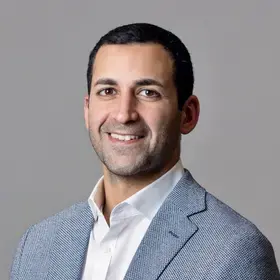Jennifer Leach, M.S., M.A. and Marianne Petit, M.P.S., M.A. had a lot in common. Both worked in higher education (Marianne at NYU and Jennifer at Columbia). They also enjoyed sharing doodles on Instagram as a way to cope with the uncertainty of the pandemic and politics. They discovered another thing they had in common: both studied in Columbia's Narrative Medicine program at different times. Jen enrolled in the Columbia M.S. program while Marianne enrolled in the C.P.A. program.
The two first met at the 2019 Graphic Medicine conference where comics about healthcare are showcased. Both presented their books (Marianne’s project was Our Hysterectomies and Jen’s was Side Defects). They reconnected online during COVID and both posted daily doodles on Instagram in response to the pandemic and their anxieties about the political climate.
Together, Jen and Marianne developed a series of workshops for clinicians and laypeople from a host of disciplines. Their goal was to reconnect participants with the doodling pleasure they once had before their inhibitions may have taken over. According to Jen, “After a particularly powerful online workshop with frontline ER residents, they wrote to tell us that they have instituted a communal sketchbook on the floor for everyone to use. After presenting this collaboration at the 2021 Graphic Medicine conference, we plan to continue the project through further workshops and an illustrated handbook in the year ahead.”
How did you learn about Columbia’s M.S. and C.P.A. programs in Narrative Medicine?
Jennifer: I actually learned about Narrative Medicine when I was working in the Department of Medicine at the Columbia University Irving Medical Center, where I managed the faculty promotions and tenure processes. This is where I met Rita Charon, who, learning about my background as an English teacher, invited me to join the Narrative Medicine book club, which met biweekly at the Medical Center. From there, I started attending the monthly Narrative Medicine Rounds, and immediately knew that I had found “my people.” I applied to the M.S. program in 2016 with Rita as my adviser.
Marianne: I first learned of Columbia’s Narrative Medicine program at the 2019 Graphic Medicine conference, and then specifically about the Certification of Professional Achievement (CPA) program three months later at the 2019 Examined Life Conference. I was so excited! The program seemed like a perfect fit given my own professional demands at work. I applied two weeks later.
What were you doing in your respective careers when you started your M.S./C.P.A.?
Jennifer: Narrative Medicine came into my life at just the right time. I had recently left a ten-year career teaching secondary English and was working as an administrator in the Department of Medicine. In my spare time, I volunteered at Word Up Community Bookshop and, as a frustrated artist, ran a small creative business on the side. I was looking for a way to challenge myself, and to reconnect with the parts of teaching that I missed—facilitating lively discussions about literature and helping others see the benefits of having an expressive writing practice.
Marianne: I am currently an Associate Arts Professor at NYU’s Tisch School of the Arts Interactive Media Arts and Interactive Telecommunications Program. I teach courses in storytelling, animation, paper craft, disability, and assistive technology. I also work with the University’s Office of Global Programs as an Associate Vice Chancellor for Global Network Academic Planning. I’ve been involved in education for my entire career. That said, my primary identification is as an artist. My work explores storytelling as well as the body. My interests are in combining technology, traditional book arts, and sequential storytelling to create new forms of narrative. I see my experience in the CPA program as expanding both.
What attracted you to the Narrative Medicine program at Columbia in particular?
Jennifer: My entry point into Narrative Medicine was my own illness experience; I was diagnosed with bipolar disorder when I was a college sophomore in the mid-1990s. This was before we had widespread access to support groups on the internet, and it was just at the time when new, atypical antipsychotics were being heavily marketed to physicians. I struggled for many years with the impact of this diagnosis and the biomedical model of psychiatry on my career prospects, my relationships, and my overall sense of self—stigma is still very real. I saw the potential for Narrative Medicine to give me the language and theoretical framework to help others like me who lived with invisible or stigmatized chronic conditions.
Marianne: As a faculty member, I had been teaching courses in adaptive and assistive technology and was one of the co-founders of the NYU Ability Project. I was also teaching courses in storytelling, and specifically about collective narrative practices. Personally, I had been volunteering with the Adaptive Design Association, a non-profit organization that builds custom adaptations for children with disabilities from readily available materials. And finally, as an artist, I was making narrative work in the space of Graphic Medicine. The Narrative Medicine program seemed like an extraordinary way to provide a framework and tie together these various seemingly separate trajectories.
Who was your favorite professor(s) and why?
Jennifer: That’s not a fair question! All of the faculty in the Narrative Medicine program were great, and each course had a unique lens into the field. I really enjoyed Illness and Disability Narratives with Marsha Hurst because it gave me a broader lens through which to understand my own mental illness, and the opportunity to see myself as an expert in my own embodied experience. It was here that I was introduced to Graphic Medicine, which is a genre of comics that tell stories of illness and care, and began to draw my first comics. In fact, While I was in the program, I actually did two independent studies: one on mental illness stigma and its impact on identity with Danielle Spencer, Ph.D. and one on the possibilities for Narrative Medicine to inform career coaching for people who live with chronic illness.
Marianne: All my professors were extraordinary! I enjoyed different courses for very different reasons. I loved the Qualitative Research course as it allowed me to work on a project with the Adaptive Design Association, as previously noted, a nonprofit organization that builds custom adaptive equipment for children with disabilities from readily available materials, such as cardboard. I’ve worked with ADA in a variety of capacities for many years. My research project was focused on the concept of “participation”. We've continued the research since completing the course. I also loved the Narrative Ethics and Social Justice courses. The readings and viewings were fantastic as were the surrounding discussion boards.
Is there an anecdote or story about the value you’ve gained and how your experience at Columbia will inform you in the future?
Jennifer: Narrative Medicine has been transformational for me, both personally and professionally. I really credit the (MS) program for helping me reinvent myself as both a Narrative Medicine practitioner and a Graphic Medicine artist. By the time I graduated from the program, I had published a book full of comic illustrations of the side effects of my medicine, and in doing so, I shared my diagnosis publicly for the first time. It was a “coming out” of sorts. I no longer feel the need to hide my diagnosis, and this is tremendously liberating.
What I love about Narrative Medicine is that it attracts people from all walks of life—recent grads on their way to medical school, veteran clinicians—and everyday people—artists, writers, patient advocates, and others who were touched in some way by illness and seek to bring light to narratives that often go unheard.
Marianne: My classmates were all working professionals coming from very diverse backgrounds, many in healthcare. Additionally, I started the program two months before the COVID-19 pandemic. Many of my classmates were frontline workers. It was a tremendous privilege to be in the same space and learn from them.


